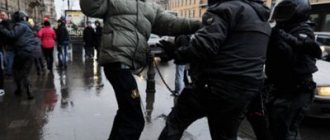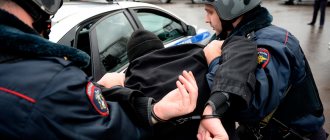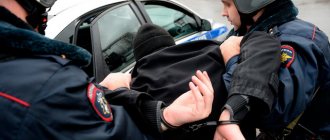Attacked a police officer on duty? Be prepared to answer before the law and receive a real sentence of 12 years to life imprisonment.
Both against an ordinary citizen and a police officer, assault, beating and any violent actions are punishable by law. If disobedience to a representative of law enforcement agencies is regulated in the Code of Administrative Offenses of the Russian Federation, then criminal punishment is provided for fighting and beating, up to life imprisonment or the death penalty.
Any illegal actions against a representative of an authority (police officer) are recognized as a threat to the entire system of the state and the work of the police department.
If you have a fight with a police officer, the lawyers of our company advise you to seek help from an experienced lawyer. This will allow you to comply with all procedural norms, prepare evidence and evidence in the case, excluding provocation on the part of the investigation and interested parties.
What is beating?
When considering beating from the point of view of criminal law, one should focus on the characteristics and elements of the crime. The object of beating is the personal inviolability of a person from physical and psychological influence of a negative nature. These rights are enshrined in the fundamental document - the Constitution of the Russian Federation.
The objective side of beating cases is considered to be the infliction of physical injuries that cause inconvenience in terms of the victim’s disability. Here we can also talk about moral damage, since mutilation is a way of psychologically influencing the victim.
The corpus delicti consists of two parts:
- Infliction of bodily harm is the active actions of a criminal, characterized by physical blows to the body of the victim. As a result, the other side develops bruises, abrasions, cuts, bruises, deep wounds and other damage to the skin. In the case of beatings, the openness of the damage may not appear. Then you should pay attention to the second component of the crime.
- Intentional act - by exerting physical pressure on the victim, the criminal takes conscious actions. Even if this manifests itself in a state of passion or under the influence of alcoholic intoxication, the perpetrator will face criminal punishment.
Summary
From the above it follows that causing bodily harm to a law enforcement officer has grave consequences for the attacker. Rarely do any of the accused get off with a fine and a minor punishment. Even the slightest blow or push, with the right approach, can be regarded as attempted murder, which implies imprisonment for up to 20 years, and in aggravated circumstances - life imprisonment.
If you become an accused or a victim, even a police officer will need the help of a qualified lawyer. You can get advice on any issue remotely on the company’s website, as well as choose a human rights defender to handle the case in court.
Violent actions against police officers
According to the rules, a police officer is considered to be a representative of the authorities who is in the service of law enforcement agencies and has the appropriate identification. A distinctive feature of a police officer is a uniform (with shoulder straps, badges, badge, etc.).
By encroaching on the life and health of a police officer, a criminal violates the public safety of citizens. A special danger lies in the fact that an attack on a police officer is, first of all, an attack on the power structure represented by law enforcement agencies. Consequently, the rowdy’s intent will be qualified not under an ordinary beating, but under Art. 318 of the Criminal Code of the Russian Federation. This speaks to a much more serious type of responsibility.
The motive for committing a crime is to prevent a police officer from performing his official duties (for example, to confiscate a driver’s license or to detain a violator for an illegal act). In many cases, beating of police officers is accompanied by personal hostility or hooligan motives. There is also a common desire to hide another, more serious crime (for example, drug production or kidnapping).
What to avoid
In practice, situations often arise when a citizen, against whom a police officer applies restrictive measures established by law, is dissatisfied with this. Conflicts between drivers and traffic police inspectors occur especially often.
In this case, the citizen should remember that the Law gives police officers the right to use physical force and even harm a person in order to prevent an offense. The police will not be held responsible for these actions.
Therefore, to avoid trouble, you should refrain from:
- insults;
- threats, including those expressed by gestures;
- failure to follow instructions;
- actions that interfere with a police officer’s work;
- attempts to snatch a service ID, badge, or take possession of a service weapon;
- attempts to spoil uniforms, etc.
If you are dissatisfied with the actions of servants of the law, the best option would be to record the process of communicating with them on camera and file a complaint about their actions with higher management, the prosecutor's office or the court.
What is the penalty for beating a police officer?
In terms of beating police officers during execution, the law provides for criminal liability under Art. 318 of the Criminal Code of the Russian Federation. Committing unlawful acts of a physical nature towards the police is punishable by:
- imposing a fine of up to 200 thousand rubles;
- deduction from the offender's wages (18 months);
- arrest for up to six months;
- assignment of forced labor for 5 years
- imprisonment for a period of 5 years.
When starting to consider such cases, the court takes into account all the circumstances and the cause-and-effect relationship. The intent of the offender, the consequences for the beaten employee, as well as the nature of the damage for the further performance of official duties are taken into account. Thus, causing grievous harm to the health of a police officer, as well as threatening his life, entail a penalty of 10 years in prison.
In some cases, beating of police officers is accompanied by aggravating circumstances, one of which is group physical force. Having established this fact, the court has the right to impose a proportionate punishment on all participants in the crime. The only exceptions are minors. But they are also subject to punishment in the form of financial penalties and registration.
Selected issues of necessary defense
Criminal legislation enshrines the right of every person to the necessary defense - protection of the personality and rights of the defender or another person from unlawful encroachment.
The grounds and limits of the competence of necessary defense are specified in Art. 37 of the Criminal Code of the Russian Federation. If they are observed, a person is released from liability for harm caused to the subject of an illegal attack, regardless of the characteristics of this subject. In other words, if a police officer, while on duty, exceeds his authority, then in order to protect himself from his illegal actions, a citizen has the right to resist him even by attacking and committing violent acts.
What to do if a police officer is beaten by a group of people?
In our society it is often said that the police are unable to protect citizens from beatings on the streets. This is only partly true, because sometimes criminals exert physical influence on people in uniform, and not acting individually, but in entire groups.
Beating a police officer is qualified under Part 1 of Art. 318 of the Criminal Code of the Russian Federation. The instructions on what an employee should do after such actions are no different from the guidelines for ordinary citizens:
- Contact a medical facility and record the fact of the beating.
- Write a statement about the group beating and take a referral for a forensic examination.
- Undergo a medical examination and determine the severity of the injuries inflicted (mild, moderate or severe harm to health).
- Start collecting evidence (DVR recording, photos, audio materials, witness statements).
As a rule, attacks on police officers are carried out by unknown persons. It is rare for an employee to know the attackers or know where to find them. This is especially true in cases of group beatings.
In the event of an attack on a police officer, the security service and the prosecutor's office become involved in the case. This is explained quite simply: beating people called upon to protect the safety of citizens should be punished to the fullest extent of the law, regardless of the identity and status of the attackers.
Author of the article
Dmitry Leonov
Work experience 15 years, specialization - housing, family, inheritance, land, criminal cases.
Author's rating
721
Articles written
712
about the author
Useful information on criminal cases
- What to do if your husband beat you?
- Beating up a policeman
- The procedure for removing beatings
- Article for beating a minor child
- Causing minor harm to health
- Statement of battery - sample
- Husband threatens physical harm and murder
- If a person threatens violence, what to do?
- Where to go if a child is beaten at school
- How to write a statement to the police about beating
- Causing grievous bodily harm
- Expertise of beatings
- Criminal liability for kidnapping
- Assault by a group of persons
- Exceeding permissible self-defense - article
- Injury at work: what should an employee do?
- Punishment for beatings
- Limits of Necessary Defense
- Unintentional injury to health
- Infliction of moderate bodily harm
Investigation of cases of attack on a police officer
According to Article 151 of the Code of Criminal Procedure of the Russian Federation, proceedings in cases of causing harm to a police officer are conducted by the Investigative Committee of the Russian Federation. This is an independent structure that reports directly to the President.
Investigative activities are carried out by the Investigative Committee, the police are involved only as an additional source of information. At the end of the investigation, the materials are transferred to the court.
Investigation into the case of beating a police officer
Investigative measures depend on the circumstances of the case. The investigator is obliged to restore the full picture of what happened: what preceded the attack, the motives of the attacker. Various methods are used for this:
- witnesses are located and questioned;
- experts are involved;
- Possible video materials are seized and reviewed.
The investigator then classifies the crime depending on the details found.
What influences the court's decision?
The most important aspect is the severity of the damage caused. Another important nuance is that the injured party is an individual police officer or the police as a government agency. Aggravating circumstances may include:
- The motive is if the crime is purely out of revenge for the professional activities of a police officer, or due to ethnic or religious hostility.
- Several persons involved.
- Preliminary coordination of the attackers' actions.
- Intent to kill.
- Holding the accused accountable for similar offenses in the past.
Note!
As mitigating circumstances, the court may consider:
- admission of guilt and cooperation with the investigation;
- ignorance and misunderstanding of the fact that the victim of an attack is a representative of the authorities;
- a situation in which a police officer exceeded his authority and behaved incorrectly.
If the consequences of the attack are not so serious - the policeman is alive, he was not seriously injured - the lawyer may suggest using Article 25 of the Code of Criminal Procedure of the Russian Federation - closing the case by reconciling the parties. To do this, the lawyer must submit a corresponding petition, and the judge, prosecutor, investigator and victim must agree with it.
What can influence the court's decision?
The judge's decision is influenced by a combination of aggravating and mitigating factors. Mitigating circumstances include:
- family composition of the accused (presence of dependents or young children);
- elderly age;
- states affecting the psyche (affect);
- pre-trial conflict resolution through reconciliation of the parties;
- full admission of guilt by the defendant and consideration of the case in a special manner. In this case, the court decision cannot be appealed.
Aggravating circumstances that can increase the severity of the chosen penalty:
- State of drug or alcohol intoxication;
- Use of weapons or auxiliary means during an attack;
- Preliminary agreement;
- A crime based on racial hatred.
Assaulting a police officer is a serious crime that carries serious penalties, up to life in prison or the death penalty. The crime is classified based on the circumstances of the case, the situation and motives for the attack, as well as the harm caused.
| Did not find an answer to your question? Call a lawyer! Moscow: +7 (499) 755-83-41 St. Petersburg: +7 (812) 917-23-31 |
Aggravating and mitigating circumstances
The court, when sentencing a defendant for assaulting a police officer, among other things, considers and takes into account a number of circumstances that affect the severity of the sentence. They are enshrined in Art. 61 of the Criminal Code of the Russian Federation “Circumstances mitigating punishment”, Art. 63 of the Criminal Code of the Russian Federation “Aggravating circumstances”.
In relation to an attack on a police officer while on duty, the following can be considered mitigating circumstances:
- the minor age of the attacker;
- pregnancy;
- presence of young dependent children;
- confession;
- on-site assistance to the victim (medical and other);
- compensation for material and moral damage to the police officer who suffered from the attack.
The court may recognize other circumstances as mitigating punishment.
Aggravates the punishment of committing a crime:
- repeatedly;
- among a group of persons;
- due to hostility (political, ideological, national, etc.);
- with excessive cruelty, sadism and bullying;
- in emergency situations (emergency, state of emergency, war, etc.);
- in a state of intoxication with alcohol or drugs.
Prevention of crimes against police officers
The Ministry of Internal Affairs of the Russian Federation keeps records of crimes.
Crime against the management system is under special control. According to the records, attacks on law enforcement officers are quite common. More than ten thousand cases have been recorded since the beginning of this year. Most of them occurred during execution. The situation with crime against employees of competent structures requires active measures for prevention and prevention.
The main directions of prevention are:
- personnel training;
- the issue of employee responsibility for the use of weapons.
Rigid order, thorough investigation, reporting for every shot fired during execution, presumed “future guilt” and sanctions for these actions, which do not contribute to the healthy use of weapons for self-defense, and therefore the practical side of responsibility for the use of weapons needs adjustments.
How is the case being investigated?
The procedure and procedure for considering such cases is described in Art. 151 Code of Criminal Procedure of the Russian Federation. According to it, the bodies of the Ministry of Internal Affairs are obliged to collect and prepare primary materials and submit them for consideration to the Investigative Committee. All actions related to the investigation of the crime of assault are carried out exclusively by the RF Investigative Committee.
The injured party in a criminal case is the police officer himself, or in exceptional cases, a government agency. The prosecution supported the prosecution during the trial.
According to Art. 25 of the Code of Civil Procedure, a case of assault on a police officer can be dismissed as a result of pre-trial reconciliation of the parties. To do this, it is necessary to reach mutual agreements between the victim and the accused.
Who investigates the cases?
Cases of such offenses are investigated exclusively by the Investigative Committee. The rule is due to the impartiality and independence of this body from the police structure.








